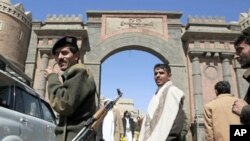Authorities in Yemen say they have arrested three men responsible for a security threat that closed down several western embassies in Sana'a this week. While the immediate problem appears to be resolved and the embassies reopened, the presence of al-Qaida in Yemen has raised alarms around the world.
The government's operations in Arhab, north of Sana'a in recent days have eased some concerns about the threat to security at western embassies, including the U.S. mission.
Yemeni officials say they have stepped up security measures to protect foreign interests in the capital and have sent thousands of troops to Arhab and other provinces in the battle against the local al-Qaida affiliate.
Professor Ahmad Seif of the Sheba Center for Strategic Studies in Sana'a says the quick reopening of the embassies has been important.
"The government has received recent information that assured that the risk has decreased," said Ahmad Seif. "It has not been eliminated fully, but at least some embassies can work."
He says the closures send the wrong message about al-Qaida's strength. Some think the group could be made up of a few dozen terrorists, other estimates range up to several hundred, but no one appears to know for sure.
It is not just the secret nature of the group, but also because there are fighters of one sort of another all over the country. There is a rebellion in the north, a secessionist movement in the south.
Sectarian, tribal and political disputes all play a role and make it easy for al-Qaida to set up base in the chaos. But perhaps the most obvious source of discontent and turmoil is Yemen's grinding poverty. The poorest nation in the Arab world, the average Yemeni makes about $900 a year.
Not that Yemen should be poor. It boasts one of the world's greatest natural seaports. It still has some untapped oil and natural gas, and with its stunning man-made and natural scenery the potential of a fabulous tourist industry.
Speaking at his home in Sana'a, Professor Seif says closing the gap between what is and what could be, should be a focus of the renewed interest in stopping al-Qaida in Yemen.
"What foreign friends can do to help Yemen exactly is to monitor closely implementing authentic reforms," he said. "There is a high level of corruption. There is resources mismanagement. And those couple of reasons have greatly contributed to the emerging of terrorism in Yemen. Not only this, but those who are not terrorists are extremely deprived, so at least they will be sympathetic to al Qaida."
As if to underscore Seif's point about infrastructure, the electricity went out during this interview.
"As you can see now, we are talking in the darkness," said Professor Seif. "These frequent blackouts in the capital, Sana'a, ... which I think is the only capital on earth witnessing this. This is in the capital. What about the countryside?"
He says mismanagement extends to even the most basic resource - pointing out that the way things are going now, the capital is likely to become the first in the world to run out of water.
Yemen Authorities Promise Extra Security Measures




